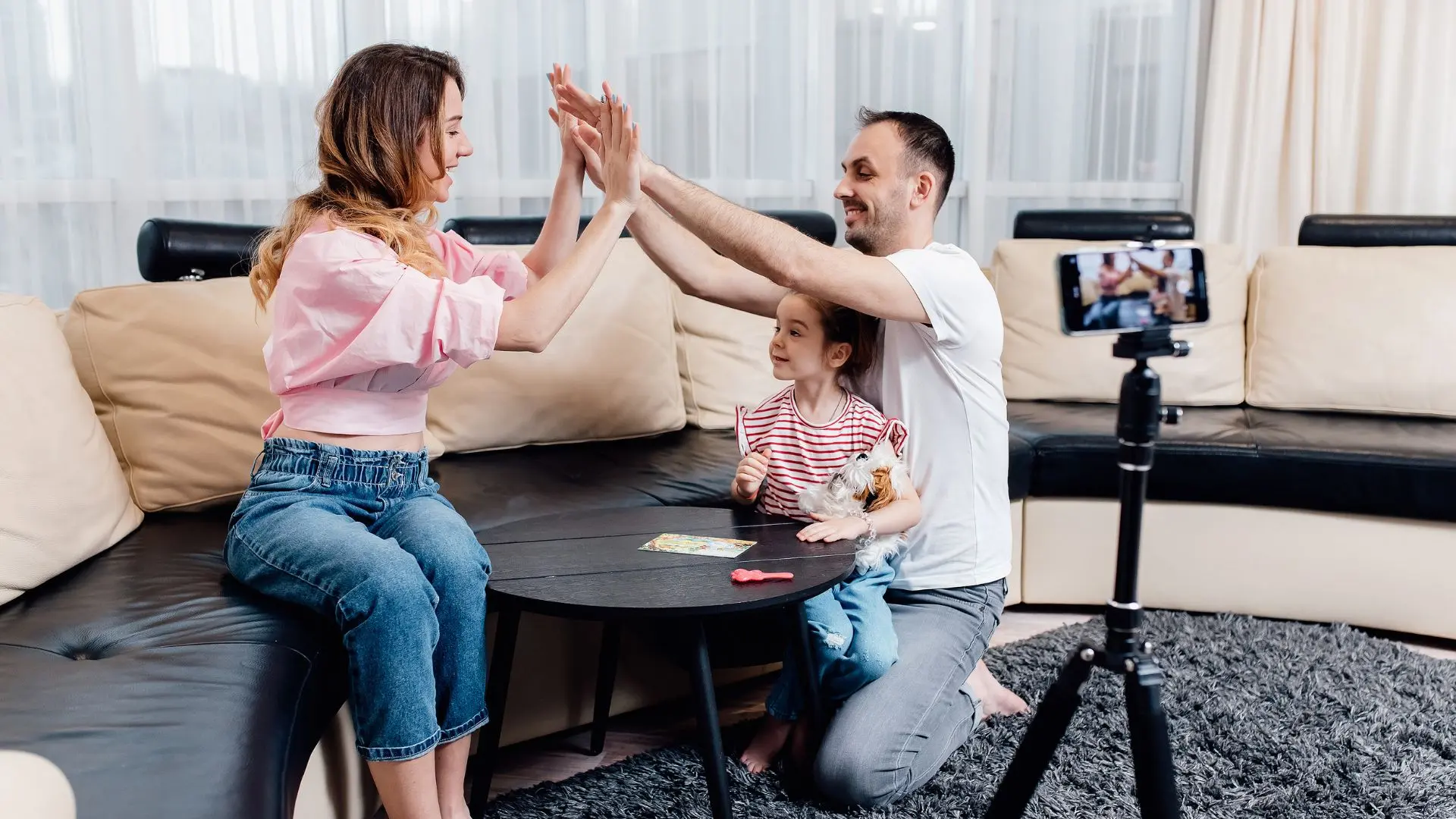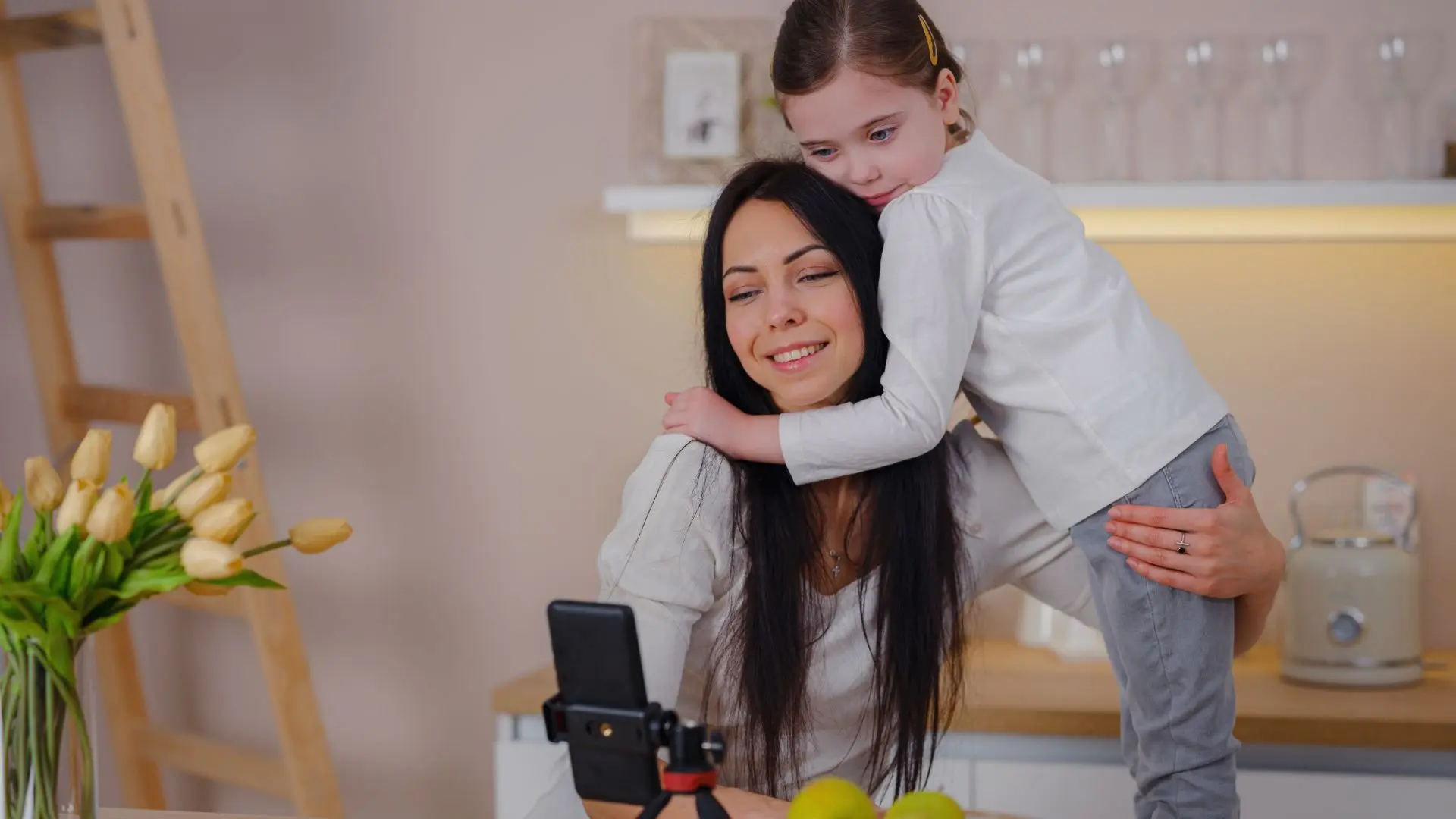
Are You One of the Many Parents on Social Media?
In a world where our smartphones often feel like an extension of ourselves, it’s hard to escape the pull of social media. Vlogging allows you to capture everything from milestone moments to the everyday chaos of parenting.
But for parents on social media, this exciting opportunity comes with a host of challenges—privacy concerns, the pressure to present a perfect image, and the risk of losing sight of genuine family interactions.
As you scroll through the feeds of moms on social media, you may find yourself inspired yet intimidated by the polished highlights of family life. Are these snapshots of joy and perfection genuine, or merely a façade crafted for likes and views? It’s all too easy to get swept away in the digital whirlwind, forgetting what truly matters: meaningful connections and cherished memories.
Below we’ll explore the pros and cons of vlogging as parents, helping you navigate this vibrant landscape while remaining true to your family’s values.
Pros of Vlogging as Parents on Social Media
Vlogging as a parent can offer numerous benefits, both for the parent and the family. Here are some key advantages to consider:
- Creative Expression: Vlogging provides a platform for parents on social media to express their creativity. Whether through storytelling, editing, or filming, it allows for artistic exploration and a fun way to document family life.
- Documenting Memories: Vlogging serves as a digital scrapbook, capturing precious moments and milestones in a way that photos and text alone cannot. These videos can be cherished keepsakes that families can revisit for years to come.
- Building a Supportive Community: Engaging in vlogging can connect parents with a larger community. Sharing experiences can foster support and camaraderie with other parents who resonate with similar challenges and triumphs.
- Learning Opportunities: Through the vlogging process, parents on social media often research and learn new skills, from video editing to public speaking. This continuous learning can enhance personal growth and open up new opportunities.
- Inspiring Others: By sharing real-life parenting experiences, vlogging can inspire and help other parents on social media facing similar situations. Authentic stories can provide reassurance and guidance, creating a sense of solidarity among viewers.
- Documenting Growth: Watching past vlogs can show how both parents and children evolve over time. This reflection can be a valuable tool for personal growth and can help parents appreciate the journey of raising their children.
- Creating a Family Legacy: Vlogs can become a legacy that families pass down to future generations. They provide insight into family values, traditions, and experiences that children can share with their own kids someday.
- Opportunities for Collaboration: Vlogging can lead to collaborations with other content creators, brands, and parenting organizations. These partnerships can provide exposure, resources, and even income opportunities for dedicated vloggers.
- Strengthening Family Bonds: The act of vlogging can encourage family members to participate together, strengthening bonds as they collaborate on content creation and engage in shared activities for the camera.
- Enhanced Communication Skills: Regularly speaking to the camera can improve a parent’s communication skills, helping them articulate thoughts and feelings more clearly—not just for their audience, but also in their everyday interactions.
These pros highlight how vlogging can be a rewarding endeavor for parents on social media, offering both personal satisfaction and the potential for community connection and legacy building.
Cons of Vlogging as Parents on Social Media
While vlogging can offer a creative outlet and a way to document family life, it also comes with several significant downsides for parents on social media. Here are some key cons to consider:
- Loss of Privacy: Sharing daily life online can lead to a significant loss of privacy for both you and your children. Once content is posted, it’s challenging to control who sees it or how it’s used, which can have lasting implications.
- Pressure to Perform: The desire for views and likes can create an environment where parents on social media feel pressured to stage their lives for the camera. This often results in inauthentic portrayals of parenting that don’t reflect real experiences.
- Impact on Family Dynamics: Constantly capturing content can interfere with genuine family interactions. Instead of being present in the moment, parents may focus more on recording than engaging with their children, which can strain relationships.
- Child’s Consent and Comfort: Vlogging often involves sharing your children’s lives without their explicit consent, especially when they are too young to understand the implications. This can lead to discomfort or resentment as they grow older and realize their lives were publicly shared.
- Exposure to Criticism: Publicly sharing parenting choices invites scrutiny and criticism from viewers. This can be stressful for parents on social media, who may face judgment or negative feedback about their parenting methods or lifestyle choices.
- Addiction to Validation: The likes and comments can create an unhealthy dependency on external validation. Parents on social media may find themselves feeling inadequate or anxious when their content doesn’t receive the expected engagement, leading to burnout.
- Misinformation Risks: Sharing parenting experiences can sometimes blur the line between personal anecdotes and credible advice. Vloggers may unintentionally promote harmful practices or misinformation, which can mislead viewers who take their advice seriously.
- Impact on Children’s Identity: Children who grow up in the public eye may struggle with their identity and self-image, feeling defined by the content shared about them rather than developing their own sense of self.
By weighing these cons, parents on social media can make informed decisions about whether vlogging aligns with their values and parenting goals.
What Parents on Social Media Should Do
There are proactive steps that can help ensure a positive experience for both parents and children. Here are some actionable recommendations for users:

- Set Clear Boundaries: Establish guidelines for what aspects of family life you are comfortable sharing online. This includes deciding which moments are private and which are suitable for public consumption. It’s essential to respect your children’s privacy and only share content they are comfortable with.
- Focus on Authenticity: Prioritize genuine moments over staged ones. Authenticity resonates with audiences and fosters a more meaningful connection with your followers. Share both the challenges and joys of parenting to create a balanced narrative that others can relate to.
- Engage with Credible Sources: While parenting and social media provide a wealth of information, not all advice is reliable. Seek out credible experts and verified sources when looking for parenting tips. This will help you avoid spreading misinformation and ensure that you’re making informed decisions for your family.
- Encourage Healthy Conversations: Use your platform to foster open discussions about parenting topics that matter to you. Encourage dialogue among followers to create a supportive community. This can be particularly beneficial for parents on social media who might feel isolated in their experiences.
- Limit Screen Time: Be mindful of how much time your family spends in front of screens, especially while vlogging or engaging on social media. Set aside dedicated family time where everyone disconnects from devices to foster deeper connections without the distraction of online life.
- Teach Children About Online Presence: As children grow, educate them about the implications of sharing personal information online. Discuss the importance of digital footprints and help them understand what is appropriate to share if they choose to engage on social media themselves.
- Prioritize Mental Health: Take breaks from social media when needed. The pressure of constantly engaging as parents on social media can lead to burnout. Prioritize your mental health by stepping back to reflect on your experiences without the noise of online validation.
- Promote a Balanced Life: Emphasize that life is not always as glamorous as it may appear online. Share moments that showcase the reality of parenting, which includes both highs and lows. This balanced approach can help counteract the curated lives often portrayed on social media.
- Seek Support: Connect with other parents on social media for advice and support. Share experiences and seek feedback from those who understand the unique challenges of raising children in a digital age. Finding a community can alleviate feelings of isolation and provide valuable insights.
- Model Positive Behavior: As a mom on social media, you have the opportunity to model positive online behavior for your children and followers. Demonstrate respect for others, engage in constructive conversations, and approach conflicts with empathy and understanding.
By implementing these strategies, parents on social media can create a healthier, more fulfilling experience for themselves and their families.
Conclusion
As we’ve explored, being a parent on social media is not just about sharing cute videos or family milestones; it’s about finding the right balance between authenticity and the allure of likes. Vlogging can create an incredible tapestry of memories and connections, but it also demands vigilance against the pressures of perfection and the risks of oversharing.
Think about what you want your online presence to say about your family. How can you share your unique story without losing the essence of your real-life experiences? Your voice matters in this space, and every perspective enriches the conversation.
Now, we want to hear from you! Have you found joy in vlogging, or have you struggled with its challenges? What tips do you have for fellow moms on social media navigating this landscape? Share your thoughts and stories in the comments below.
You may also be interested in : Parenting Burnout: Symptoms, Stages, Assessment, and Prevention Strategies